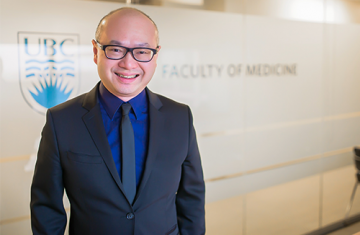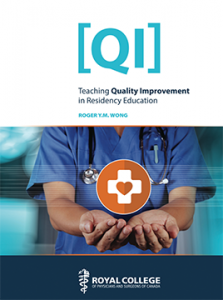
Dr. Roger Wong, Associate Dean of Postgraduate Medical Education
When it comes to making improvements in the healthcare arena, UBC’s Roger Wong, Associate Dean of Postgraduate Medical Education, knows medical residents have a key role to play.
But what’s the best way to equip the next generation of medical practitioners with the skills and knowledge needed to improve clinical processes and patient care over the course of their training and medical career?
This fall, a new e-book, Teaching Quality Improvement in Residency Education, will shed light on teaching quality improvement (or QI) in the healthcare setting, a topic that has garnered increased attention from postgraduate medical education programs here at UBC, and across the country in recent years.
The user-friendly publication, which offers practical tips and tools for teaching (and assessing) QI competencies, represents a culmination of years of medical education research by Dr. Wong. Developed in partnership with the Royal College, the new resource will be officially unveiled during the upcoming International Conference on Residency Education in Vancouver, running October 22-24.
We recently sat down with Dr. Wong to find out where his passion for teaching QI began, and what the new e-publication will mean for medical educators and residents across Canada.
When did the idea for this e-publication emerge?
Years ago, before my time as the associate dean of postgraduate medical education, I served as the associate program director of UBC’s Internal Medicine Residency program. At that point in time, the topic of quality improvement was beginning to gain a lot of attention in the medical community, and there was certainly a strong appetite here at UBC to develop a QI curriculum to teach residents.
So I decided to take on the task. Back then, very little had been written about the subject of teaching and assessing QI competencies, so I knew taking on the project would be challenging, and offer an opportunity to be quite innovative.

Dr. Wong’s new book, Teaching Quality Improvement in Residency Education, will launch during the upcoming International Conference on Residency Education, taking place October 22-24.
After implementing the new QI curriculum within the UBC environment, my colleagues and I began to share our thoughts and experience with medical educators from across the country. By 2007, I had received national recognition for my work, earning the Royal College’s Donald Richards Wilson Award, which recognizes those who have demonstrated excellence in integrating the CanMEDS roles into a Royal College training program.
Our QI curriculum continued to catch the attention of a lot of people — including the Royal College’s Dr. Jason Frank, Director of Specialty Education, Strategy and Standards, who recommended I partner with the Royal College to write a book about teaching QI to residents. Not one to turn down an opportunity, I agreed and worked with the Royal College to develop the e-book. Looking back, although it was a lot of work, I’m so glad I took on the project — I had the opportunity to meet and work with a very talented pool of people from both within the Royal College, as well as the UBC environment.
What can readers expect to take away from your book?
While many people recognize the importance of continuous improvement in the quality of care delivered in healthcare and in medicine, a lot of times, what they may not realize is how essential it is to teach our up-and-coming physicians and surgeons about QI — it’s a skillset and competency that must be taught like any other.
The intention of this book is provide a user-friendly guide for medical educators looking to develop and implement a QI curriculum. The publication covers everything from setting learning objectives to assessing competencies and curriculum evaluations (at the foundational and advanced level). Readers will walk away a host of tips, lessons learned, and assessment tools that they can download and modify to meet their specific program needs. Another big feature of this book is that it is very resident focused and looks at how trainees can be engaged and inspired to get involved in the important work of quality improvement in the healthcare setting.
At the upcoming International Conference on Residency Education (ICRE), where the new CanMEDS framework will be launched, the book is being positioned as one of the tools that can help residency programs implement competency-based curriculum.
Why are you passionate about this topic?
As a medical educator, I have the pleasure of meeting and working closely with residents. And over the years, many have come to me with stories and examples of processes in clinical settings that they feel are not working as effectively or efficiently as they could be. At first, they feel quite discouraged about what impact they can make ‘as just residents’ — but after being exposed to the QI curriculum, and learning about some of the methodology and tools at their disposal, I see a huge change in their outlook — they feel empowered. By teaching future doctors how to do quality improvement work, we are empowering them with tools to make a change for the better of healthcare, and their patients. So, for me, QI is really a fundamental skillset that makes a huge impact, and being able to publish and share what I’ve learned about QI with other medical educators and residents is very exciting.
Copies of Dr. Wong’s e-book, Teaching Quality Improvement in Residency Education, are now available on the Royal College’s website.